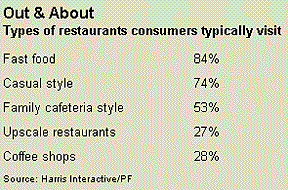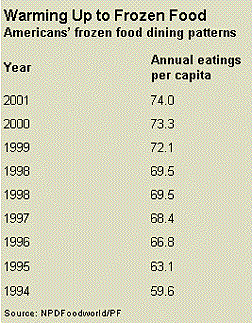
Less than 1% of the consumers mentioned food safety or security concerns as their reason for eating out less, but the primary culprit varied for each restaurant style. While 62% ate less fast food due to more healthful eating habits, 44% of those eating less in casual restaurants cited reduced disposable income as their motive. Similarly, 57% of consumers said they are eating less in upscale restaurants because they are “too expensive/can't afford it.”
Harris Interactive found that around a fifth of respondents were eating out less because they preferred to stay home. While the events surrounding September 11 may have been at least partially to blame, the report also attributes some of the eating-out decline to the “cocooning” trend, which was well underway prior to September.

THE IN BOX:
The U.S. Department of Justice has approved Cargill's, Minneapolis, acquisition of Mondedison's 56% share of Cerestar, Paris. The European Commission has already granted its approval of the transaction.Chiquita Processed Foods, LLC, New Richmond, Wisc., has added a second low-acid aseptic processing line at their Princeville, Ill., pumpkin facility.
Rhodia Food, Cranberry, N.J., has opened new research and development facilities in Aubervilliers, representing an investment of 4.6 million Euros (US $4 million).The U.S. Pharmacopeia has named V. Srini Srinivasan acting vice president of its dietary supplement verification program.
The Southwest Research Institute, San Antonio, has promoted Niraj Vasishtha to director of the department of microcapsules, coatings and polymers.
Foodservice Prospects
As an industry segment, foodservice provides a great opportunity for food manufacturers. However, customer demands also must be met.“There is a big push for prepared foods items,” says Tom Miner, Lettuce Consulting Group, the foodservice consulting arm of restaurant company Lettuce Entertain You, Chicago. “There is a broader selection of truly high-quality entrees that work well in any casual setting,” he notes. One result is that operators are increasing their use of these pre-prepared items.
Both regional and national chains are moving away from in-house production, even “speed scratch” preparation where they buy an item and dress it up. “They can't get the consistent quality that they want in-house. They also want to reduce labor in the back of the house by 25 to 30%. However, they still want products that are differentiated, which drives growth in customized foods,” Miner adds.
As for types, Italian food is in a bit of lull because usage is already broad. Oriental and Mexican/Latino food show strong growth, driven by varied menu concepts—not just in casual and family dining, but also in QSR (quick service restaurants).
THE IN BOX:
CFF, Chestertown, Md., the new formal name for CreaFill Fibers Corp. and formerly known as Cellulose Filler Factory Corp., has new owners and is reorganizing. A manufacturer and distributor of cellulose fibers, CFF expects to expand its product lines and production capacity.Stephen Dott has been named vice president of Grande Cheese's custom ingredients group, Lomira, Wisc.
RFI and Hauser Inc. have formed a strategic alliance. RFI, Blauvelt, N.Y., and Hauser, Long Beach, Calif., and Longmont, Col., will supply dietary supplement and functional food ingredients to the nutraceuticals industry.

Frozen is Hot
While restaurants may be seeing a decline in their market share, the world of frozen foods is reaping the rewards, says a new report from NPDFoodworld, Rosemont, Ill. Continuing a steady growth (10 years strong and counting), frozen meals were the choice six times a month between March 2000 and February 2001. That reflects a 33% increase since 1992.Arnie Schwartz, vice president of NPDFoodworld, says, “With 80% of meals eaten at home, but Americans spending less time in the kitchen, frozen food manufacturers appear to have hit their stride and are giving restaurant take-out some competition.”
For more information, contact 847-692-1736.